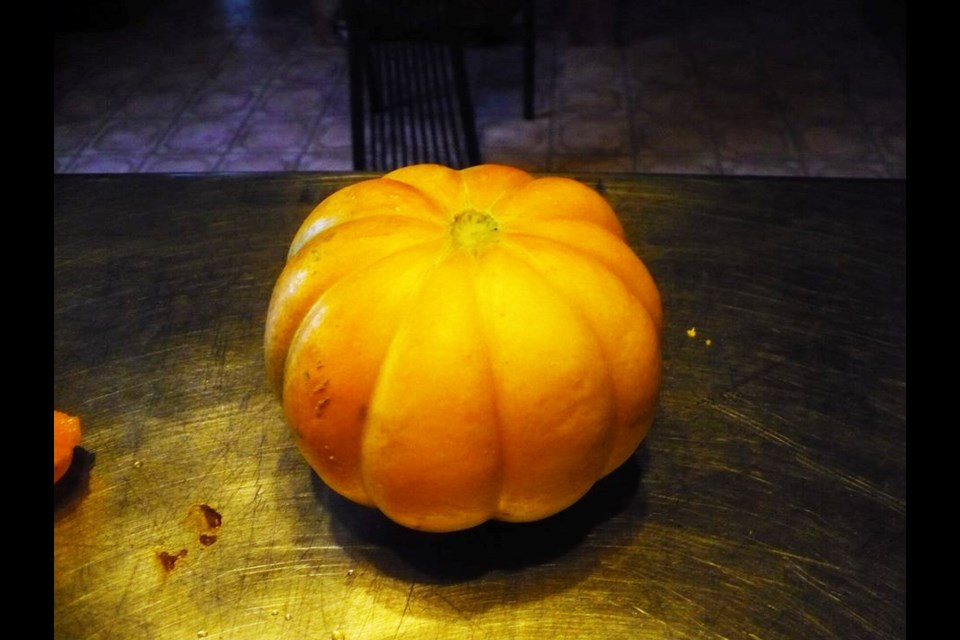A Prince George area farmer has grown cantaloupe in his field from seed to harvest.
"That's what you can do with non-hybrid, non-GMO seeds," said Andrew Adams of Hope Farm Organics, a 150-acre farm located east of Eaglet Lake about 40 km from Prince George. "One of my biggest passions is growing food but we have a certain climate here that doesn't allow us to grow a lot of the food that we like to eat."
No oranges, no bananas and no cantaloupes.
Until now.
Adams chose to put the effort into the cantaloupe simply because he loves the fruit. He grew up in Kansas growing them, eating them fresh out of the garden.
"The taste and the smell is invigorating and there's a bit of nostalgia with it so I set out to look for an heirloom variety of cantaloupe in 2009-2010," said Adams.
Heirloom varieties of seeds are typically open pollinated seeds. These varieties are bred for flavour and heartiness in different regions of the world. Typical hybrids are often grown in foreign countries and they always promise high yield but it's at the expense of flavour, Adams said. After doing some research he found the Noir Melon variety of cantaloupe developed by French monks, which was grown in a colder area of France.
"Now most people wouldn't put so much effort into cantaloupe but I really miss eating fresh cantaloupe and the stuff from the store - it looks like a cantaloupe - but it's not a cantaloupe," said Adams, who knew it would be a challenge to successfully grow cantaloupe in Prince George without a greenhouse.
The first year the seed was planted, it grew but did not produce anything, Adams said. In 2011 Adams moved from a rented farm near Old Summit Lake into Prince George and planted seed and it grew some but only produced one cantaloupe.
In 2012 Adams moved to Hope Farm with wife Janie Roberge.
"We chose an extremely difficult area to grow vegetables and we took the seed out there, put it in the greenhouse and put the plants directly into our clay soil, which was in poor condition."
It produced a couple more cantaloupe.
To develop heirloom seeds the grower pulls the seed from the best cantaloupe each season. A perk of the heirloom variety of seed is it will adapt to regional climates, said Adams.
More were grown in the greenhouse the next seasons and Adams had put one outside to see how it would do but the fruit would never fully ripened. He persisted without much success until this year.
"We finally produced cantaloupe in the field without aid," said Adams. "Now part of the success was because we didn't get our mid-July frost this year - we hit two degrees but there was no frost."
There was frost at the end of the season but for some reason the 100 or so cantaloupe in the field were not affected.
"So we now have an even better strain of seed," said Adams, who started the Seed Saving Initiative through the Eaglet Lake Farmers Institute that turned 100 years old this year.
"I am encouraging farmers within the institute to start developing seed and to start saving seeds," said Adams. "Typically this is something that's been done through government grants and agricultural experimentation stations but those don't exist here anymore so it's up to the local farmers to do it."
Adams said he will be giving fellow farmers the cantaloupe seed to get them to grow it on their farms in a seed trial. He also asked those that got the cantaloupe in their Community Supported Agriculture Good Food Boxes to enjoy the fruit but keep the seeds and grow them and report back to him.
In the meantime Adams will continue to develop the seed on his own farm where he grows onions, potatoes, beets, carrots, cabbage, kale, greenhouse crops like tomatoes and cucumbers as well as raising ducks, geese and chickens. Adams has also left 80 acres of the 150-acre farm as natural forest to forage for herbs, berries and wild game, with the aim of becoming a zero input farm, meaning no seed, no feed and completely self sufficient.
To encourage its hardiness, Adams makes sure to abuse the plant as much as possible.
"And it's winning, it's surviving," said Adams, who has a bachelor's degree in science and agriculture.
To abuse the plant means to expose it to heat and drought, cold and flood, so Adams planted the seeds at the bottom of a hill on the farm, the coldest place to grow anything.
"I plant the seeds in a row, I give them very little water, I don't cover them up and I hardly weed them at all," said Adams, who said he could tell when the cantaloupe were ripe just by the scent emanating from the plant. "Then I see which one of the plants produced a decent fruit and I'll take the seed from there. Because now the plant has shown you which one has the traits to go through those hard periods."
Adams hopes in time he will develop a seed that is sellable.
Next year Adams is going a lot bigger into cantaloupe. He will sow the seed into a better soil at a higher elevation which offers a warmer temperature.
"So I will throw a whole bunch on there and basically I won't water them and I will just see what happens," said Adams. "It's kinda blowing my mind how much the seed has changed in six growing seasons. It really shows you how much open-pollinated heirloom varieties can adapt. If it can survive a lot of neglect, it's allowed to live here."



